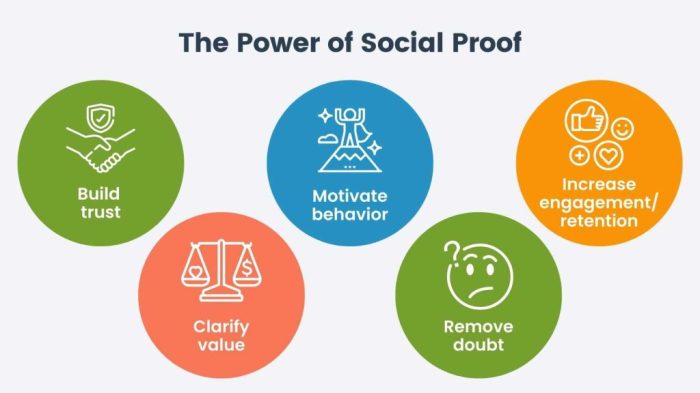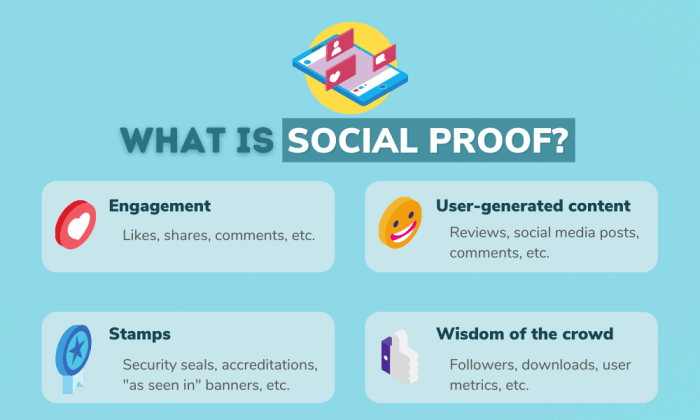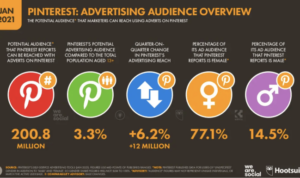Social Proof Strategies take the spotlight as we dive into the world of marketing influence and credibility. Get ready for a ride filled with examples, tips, and insights that will elevate your marketing game to the next level.
Introduction to Social Proof Strategies

Social proof is a psychological phenomenon where people assume the actions of others in an attempt to reflect correct behavior for a given situation. In the business world, social proof plays a crucial role in influencing consumer behavior and building trust with potential customers.
Social proof strategies are techniques used by businesses to leverage the power of social proof in their marketing efforts. By showcasing positive feedback, testimonials, endorsements, and social media shares, companies can influence potential customers to make purchasing decisions.
Examples of Successful Social Proof Strategies
- Customer Reviews: Amazon displays customer reviews and ratings on products to help shoppers make informed decisions.
- Celebrity Endorsements: Nike collaborates with athletes like Michael Jordan to create a positive association with their brand.
- Social Media Influencers: Fashion brands partner with influencers on platforms like Instagram to reach a wider audience and gain credibility.
- Case Studies: HubSpot showcases success stories of clients to demonstrate the effectiveness of their marketing software.
Types of Social Proof
Social proof plays a crucial role in influencing consumer behavior and building trust. There are various types of social proof that businesses can leverage to establish credibility and attract customers.
Testimonials
Testimonials are personal recommendations or endorsements from satisfied customers. They showcase the positive experiences of real people with a product or service. For example, a clothing brand may display testimonials from customers praising the quality and style of their products on their website.
Reviews
Reviews are feedback or ratings given by customers based on their experiences with a product or service. Platforms like Yelp, Google Reviews, and Amazon allow customers to leave reviews that can influence potential buyers. Positive reviews act as social proof, while negative reviews can also provide valuable feedback for improvement.
Social Media Followers
The number of followers a brand has on social media platforms like Instagram, Facebook, and Twitter can serve as social proof of its popularity and credibility. For instance, a skincare brand with a large following on Instagram may be perceived as more trustworthy and reputable by potential customers.
Celebrity Endorsements
When a well-known celebrity or influencer promotes a product or service, it can significantly impact consumer perception. Celebrity endorsements can create a sense of trust and desirability among consumers. For example, a famous athlete endorsing a sports drink can influence consumers to try the product.
User-Generated Content
User-generated content, such as customer photos, videos, or testimonials shared on social media, can provide authentic social proof. When potential customers see real people using and enjoying a product, it can build trust and credibility. Brands can repost user-generated content to showcase positive experiences.
Expert Recommendations
Expert recommendations from industry professionals or influencers in a specific field can reinforce the credibility of a product or service. For example, a skincare product recommended by a dermatologist can instill confidence in potential customers regarding its effectiveness and safety.
Group Endorsements
Group endorsements involve showcasing that a large number of people or a specific group supports a product or service. This can include displaying logos of companies that use a particular software or featuring badges of certifications and affiliations. Group endorsements demonstrate social acceptance and reliability.
When to Use
Each type of social proof can be effective in different marketing campaigns based on the target audience and the nature of the product or service being promoted. Testimonials and reviews are great for building trust and credibility, while social media followers and celebrity endorsements can attract attention and drive sales. User-generated content adds authenticity, expert recommendations establish authority, and group endorsements demonstrate social acceptance. It’s essential to strategically use various types of social proof to create a well-rounded marketing strategy that resonates with consumers.
Implementing Social Proof Strategies
Implementing social proof strategies in marketing efforts can greatly enhance a business’s credibility and trustworthiness among consumers. Here’s a step-by-step guide on how to effectively incorporate social proof into your marketing strategy:
Collecting Social Proof
- Encourage satisfied customers to leave reviews and testimonials on your website or social media platforms.
- Showcase user-generated content such as photos, videos, or social media posts featuring your products or services.
- Utilize influencer partnerships to leverage their social proof and reach a wider audience.
Showcasing Social Proof
- Display customer testimonials prominently on your website and in marketing materials.
- Create case studies highlighting successful customer experiences with your brand.
- Integrate social proof widgets and badges on your website to showcase real-time interactions and testimonials.
Impact of Social Proof
- Social proof builds trust with potential customers by showing that others have had positive experiences with your brand.
- It can influence purchasing decisions as consumers are more likely to trust a product or service that has been recommended by others.
- By effectively implementing social proof strategies, businesses can boost their credibility and improve conversions.
Tools and Platforms for Social Proof

Social proof is a powerful tool for businesses to build credibility and trust among their customers. Utilizing various tools and platforms can help businesses gather and display social proof effectively. Let’s explore some of the options available and best practices for maximizing the impact of social proof.
Social Proof Tools
- TrustPulse: This tool allows businesses to display real-time customer activity notifications on their website, such as recent purchases and sign-ups.
- Yotpo: Yotpo helps businesses collect and showcase customer reviews, photos, and Q&A to build trust and drive conversions.
- ProveSource: ProveSource enables businesses to show real-time social proof notifications, such as live visitor counts and recent activity, to boost credibility.
Social Proof Platforms, Social Proof Strategies
- Google Reviews: Encouraging customers to leave reviews on Google can enhance a business’s online reputation and influence potential customers.
- Facebook Recommendations: Businesses can leverage Facebook recommendations to showcase positive feedback from customers and increase credibility.
- Instagram Stories: Using Instagram stories to share user-generated content and testimonials can create authentic social proof for a business.
Best Practices for Utilizing Social Proof Tools
- Choose tools that align with your business goals and target audience to ensure relevance and effectiveness.
- Regularly update and refresh social proof content to keep it current and engaging for visitors.
- Integrate social proof tools seamlessly into your website or marketing channels to provide a seamless user experience.





